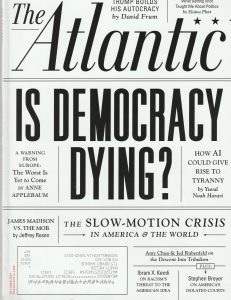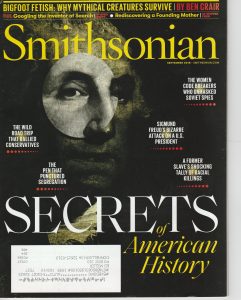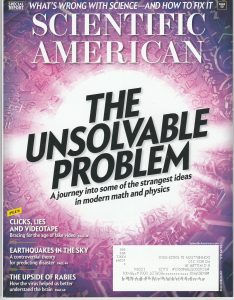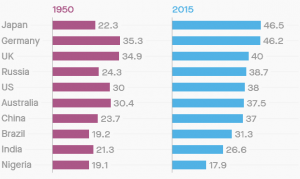Regular readers will know that mariner’s favorite magazine is The Atlantic (TA). He has added a few to his personal library. There are several other magazines in its class that provide cogent insights in the social sciences and can be trusted to deliver balanced reality based on studied facts. TA often approaches scholarly levels in its presentation of the human experience.
Not everyone would want to spend the time and focus required to read TA. When TA focuses on an issue, it is a  3-credit course on the subject. An excellent example of this pattern is the October 2018 issue. The cover headline asks, “Is Democracy Dying?” Nine articles are referenced right on the cover that provides an excellent base for understanding the turmoil of contemporary society, politics and governance.
3-credit course on the subject. An excellent example of this pattern is the October 2018 issue. The cover headline asks, “Is Democracy Dying?” Nine articles are referenced right on the cover that provides an excellent base for understanding the turmoil of contemporary society, politics and governance.
Reading TA cover to cover in one sitting is not recommended. Mariner keeps copies of recent magazines on his dining room table to be perused an article at a time. When the October issue is completely read, one is knowledgeable, capable of thematic reasoning about democracy, and aware of the human experience dependent on democracy.[1]
– – – –
Writing about life experiences often drops to melodramatic levels which certainly are valid but limit the reader’s ability to contemplate broader views. One magazine that is unique in presenting holistic articles about reality that give a reader room to ponder is Smithsonian Magazine (SM).
Like TA, SM often promotes a theme for its articles but SM also includes articles about the world, interesting individuals, nature, and often, articles based on the Smithsonian Museum collection in Washington D.C. SM is a pleasant read.
The September 2018 edition focuses on moments in American history that have been forgotten or that provide insight into unknown situations. The issue also includes articles about Rhinos in Washington and a toy school bus.[2]
– – – –
There are several magazines about science. Most are focused on one kind of science like astronomy or health or agriculture. Three magazines, Science, Nature and  Scientific American, are widely read. Over time mariner has chosen Scientific American Magazine (SA) because it is totally comprehensive in its range of science and technology and at the same time provides reader-friendly articles and references. Every edition has an endless insight into diverse – and often surprisingly humanistic – branches of science that enrich the reader’s familiarity with science.
Scientific American, are widely read. Over time mariner has chosen Scientific American Magazine (SA) because it is totally comprehensive in its range of science and technology and at the same time provides reader-friendly articles and references. Every edition has an endless insight into diverse – and often surprisingly humanistic – branches of science that enrich the reader’s familiarity with science.
Like other recommendations, SA often sets a theme for an issue. In the October 2018 copy, the theme is “How to fix Science” It covers funding, enforcing the ability to reproduce research claims, dealing with government denial, and increasing interdisciplinary research. There is an article preparing us for fake videotape and fake audio.[3]
– – – –
Each of the above magazines has a strong Internet presence. Mariner and his wife enjoy reading books and magazines in print form but for many who are too busy or who prefer to pick and choose what to read, mariner recommends both the official websites and subscribing to their newsletters that arrive in your email.
Another source for intelligent, dependable dialog is the collection of National Public Radio (NPR) products and broadcasts. If one is more interested in good fiction than nonfiction, there is no better place to look for a good book than NPR’s Book Concierge at https://apps.npr.org/best-books-2018/ . On the other hand, the NPR news page avoids the hysterical advocacy of TV news; see https://www.npr.org/ . This home page will lead you to broadcasts, podcasts and other entertaining – and rational – information.
Remaining informed is similar to keeping fit. It requires commitment.
Ancient Mariner
[1] Fortunately, TA has an excellent archive. To read the articles in the October 2018 issue, see:
https://www.theatlantic.com/magazine/toc/2018/10/
[2] Find SM archives at https://www.smithsonianmag.com/issue/archive/
[3] Find archive issues at https://www.scientificamerican.com/store/archive/?magazineFilterID=Scientific%20American%20Magazine

